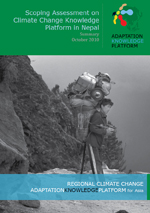The scoping report gives an insight into the institutional landscape, policies, laws and regulations. It also looks at exploring the knowledge-policy interface in the context of climate change adaptation and also the utilization of knowledge for policy change. Developing countries such as Nepal require basic capacity-building in research skills at all levels of government and within all educational establishments. There is a need to educate the staff of government departments so that they can influence higher-up officials to strengthen policymakers and researchers. A key issue in knowledge management is providing access to funding and ensuring that research institutions are guaranteed intellectual independence. By recognizing that knowledge production and use requires a pluralistic domain, we can grant everyone the freedom to choose while at the same time helping humans adapt to climate change vulnerabilities. Promoting the ability to assess risk and make knowledge- based decisions can help people address whatever constraints the future may toss at them. The platform should enable different types of knowledge systems to find salience in the public discourse. Referring to the challenge of new knowledge, NCVST (2009) has suggested combining high science with the civic science of common, everyday Himalayan experience as an iterative process.


